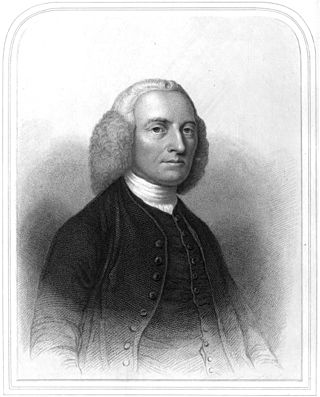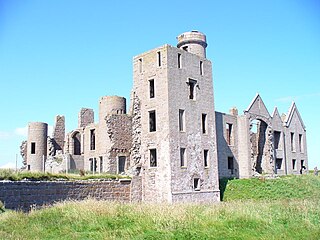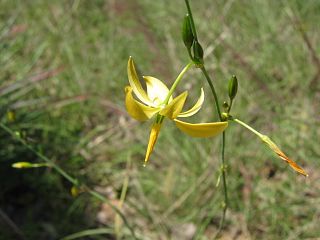| |||||
| Centuries: | |||||
|---|---|---|---|---|---|
| Decades: | |||||
| See also: | List of years in Scotland Timeline of Scottish history 1012 in: England • Elsewhere | ||||
Events from the year 1012 in the Kingdom of Scotland .
| |||||
| Centuries: | |||||
|---|---|---|---|---|---|
| Decades: | |||||
| See also: | List of years in Scotland Timeline of Scottish history 1012 in: England • Elsewhere | ||||
Events from the year 1012 in the Kingdom of Scotland .

Alexander Cruden was the Scottish author of an early Bible concordance, a proofreader and publisher, and self-styled Corrector of the nation's morals.

Delgatie Castle is a castle near Turriff, in Aberdeenshire, Scotland.

Slains Castle, also known as New Slains Castle to distinguish it from the nearby Old Slains Castle, is a ruined castle in Aberdeenshire, Scotland. It overlooks the North Sea from its cliff-top site one kilometre east of Cruden Bay.

Cruden Bay is a small village in Scotland, on the north coast of the Bay of Cruden in Aberdeenshire, 26 miles (42 km) north of Aberdeen.

Dame Elisabeth Joy Murdoch, Lady Murdoch, also known as Elisabeth, Lady Murdoch, was an Australian philanthropist and matriarch of the Murdoch family. She was the wife of Australian newspaper publisher Sir Keith Murdoch and the mother of international media proprietor Rupert Murdoch. She was appointed a Dame Commander of the Order of the British Empire (DBE) in 1963 for her charity work in Australia and overseas.

A Complete Concordance to the Holy Scriptures, generally known as Cruden's Concordance, is a concordance of the King James Bible (KJV) that was singlehandedly created by Alexander Cruden (1699–1770). The Concordance was first published in 1737 and has not been out of print since then. Two editions of the Concordance appeared during his lifetime, 1761 and 1769. (Reference 1955 edition)

Tigridia, is a genus of bulbous or cormous flowering plants belonging to the family Iridaceae. With common names including peacock flowers, tiger-flowers or shell flowers, they have large showy flowers; and one species, Tigridia pavonia, is often cultivated for this. The approximately 60 species in this family grow in the Americas, from Mexico down to Chile.
Sighthill is a neighbourhood in the Scottish city of Glasgow. It is situated north of the River Clyde and is part of the wider Springburn district in the north of the city. It is bordered to the north by Cowlairs, to the east by the Springburn Bypass road and the Royston neighbourhood, to the west by the Glasgow to Edinburgh via Falkirk Line and to the south by the Townhead interchange of the M8 Motorway.

Whinnyfold or Whinneyfold is a small coastal village at the southern end of the Bay of Cruden in Aberdeenshire, Scotland.
Cruden is a surname. Notable people with the surname include:

Cruden Bay railway station was a railway station serving Cruden Bay, Aberdeenshire, Scotland.

Aaron Wiremu Cruden is a New Zealand rugby union player, who plays for Waikato and formerly Montpellier, Manawatu and New Zealand internationally. Cruden's usual position is fly-half.
Cruden Bay Junior Football Club are a Scottish football club from the village of Cruden Bay, Aberdeenshire. Members of the Scottish Junior Football Association, they currently play in the North Second Division. Founded in 1934 as an Amateur side, they stepped up to the Junior grade in 1995. The club are based at Watson Park, formerly known as Bayfield Park, and the club's colour is purple.

Echeandia is a genus of New World plants in the century plant subfamily within the asparagus family.

The Cruden Bay Hotel Tramway operated an electric tramway service between the Cruden Bay Hotel and Cruden Bay railway station between 1899 and 1940.
The Boddam Branch Line was a 15-mile branch railway line constructed by the Great North of Scotland Railway (GNoSR) from Ellon railway station to Boddam in Aberdeenshire. It opened in 1897. As well as serving the small fishing port of Boddam and nearby stone quarries, it connected to the Cruden Bay Hotel, a luxurious resort hotel established and operated by the GNoSR. As a United Kingdom railway-owned resort hotel, the hotel was an unusual development.
John Cruden (1754–1787) was a Scottish merchant and Loyalist leader of the American Revolutionary War.
The Battle of Cruden Bay is said to have occurred in the summer of 1012 in the North East of Scotland, between Scottish forces led by King Malcolm II, and Norwegians and Danes led by, among others, the teenage son of King Sweyn Forkbeard, who was later to become King Cnut the Great of England.

The Water of Cruden is a short broadly east-flowing river in Buchan in northeast Scotland. Its headwaters streams rise in the countryside north of Ellon and combine to flow through the village of Hatton and onward to the village of Cruden Bay where it then enters the North Sea at the north end of the Bay of Cruden. It is crossed at various points by the A952, A90 and A975 roads. The harbour of Port Erroll stands at the point that the tidal channel enters the sea. The name Cruden is said to derive from Gaelic 'croch Dain' signifying the 'slaughter of the Danes. referencing the Battle of Cruden.

Cruden Bay Hotel was a hotel in Cruden Bay, Aberdeenshire, Scotland. Following the success of the Palace Hotel in Aberdeen, it was built between 1897 and 1899 by the same owners. It closed in 1932 and was demolished between 1947 and 1952.